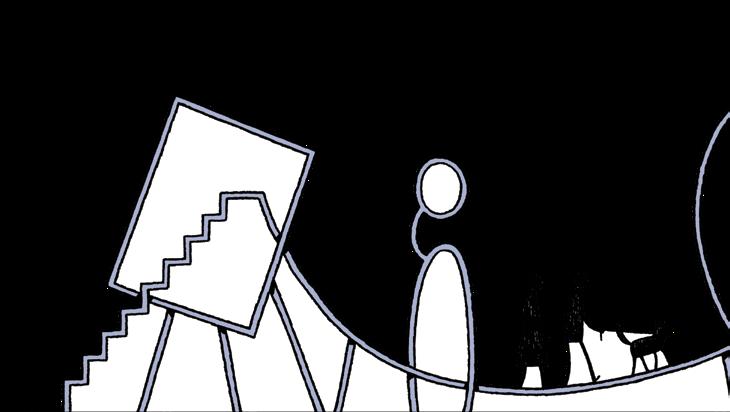dons at the college where he is an associate fellow, and becoming exasperated at the small-mindedness of the academic outlook. Meg isn’t quite right. From his book, it seems that Foster is more of an oldfashioned misanthrope. You can’t help noticing that his fastidious palaeolithic experiment lacks an essential ingredient of that era. Real palaeolithic men lived in tribes. There would have been other men, children and women (notably absent from his utopia) to negotiate. If there is a precedent for Being a Human, it’s that great Enlightenment satire Gulliver’s Travels. Foster shares Swift’s moral outrage and revulsion at humanity’s material grossness. As with Gulliver, each journey is just a reflection of his own place and time. Being a Human doesn’t tell you more than any other work of speculative anthropology about the conditions of life in the deep past, but it tells you a lot about the interesting Charles Foster. And that’s enough.
OLDIE NOVEL OF THE MONTH
New York state of mind PAUL BAILEY Harlem Shuffle By Colson Whitehead Fleet £16.99 Colson Whitehead writes historical novels about the kind of people most historians tend to ignore, through either ignorance or deliberation. The limitlessly resilient Cora, the central character in his masterly The Underground Railroad, could be considered an amalgam of every brave black woman who has fought her way out of slavery, were it not for the fact that she exists as a unique individual on the page. Great names are mentioned in Whitehead’s fiction, but only as background figures. He shares the distinction with the insufficiently lauded E L Doctorow – author of Ragtime and Billy Bathgate – of being interested, almost to the point of obsession, with the news behind and beyond the front-page headlines. When you stop to consider it, that’s really our news in the main. His latest novel, Harlem Shuffle, opens in 1959 and comes to a surprising close in 1964. At that time, Blacks were called Negroes in polite usage, and so it is here. We meet the book’s seriously flawed hero, Ray Carney – a dealer in secondhand furniture, radios, washing machines and TV sets – as he bustles around New York City on a typical day,
on the very first page of what will become a complex narrative. Ray is a man who intends to make a good life for himself and his young family. He has already established a reputation for fairness and decency with the store he has opened near Harlem’s 125th Street, which is attracting a reliable clientele. He has married, some would say above his means, the beautiful, wellspoken Elizabeth Jones, whose parents, Leland and Alma, take regular delight in reminding their ambitious son-in-law of his lowly origins. Ray’s drunken father was a hood, not of the very worst kind, but bad enough. The memory of Big Mike Carney is an inspiration to the boy he abandoned to better himself and his loved ones at any cost. The bane of Ray’s existence is his feckless cousin Freddie, a charming junkie who worships Debbie Reynolds and whose need for a fix lands him and, as a consequence, Ray in sometimes spectacular trouble. Freddie disappears for long periods and Ray wonders and worries what he is up to before receiving the inevitable phone call or visit from Freddie that puts previous troubles in the shade. Ray finds himself becoming a fence for stolen goods like jewellery and expensive watches and, soon enough, his business starts to thrive. His store takes on the appearance of a salon, with new, up-todate furniture on offer at competitive prices. He has an extension built. He rents an apartment on Riverside Drive. It becomes apparent, as the story progresses, that Colson Whitehead has a particular gift for nuance, even as the events he is describing threaten to be extreme. Ray somehow retains his essential goodness, not least in his dealings with Freddie, for whom he feels an unwavering, if exasperated, affection.
They were fatherless boys together, in the bad times, finding happiness wherever they could, and that is one memory Ray can’t shake off. Harlem Shuffle would be a different book without the presence of this hopeful, unlucky chancer, who forms a friendship with a white drop-out named Linus Van Wyck, from an excessively wealthy family with a mansion on Park Avenue. They become inseparable, and Whitehead makes it clear, without emphasis, that Linus is enamoured of Freddie and sexually attracted to him. They are companions in blissful distress, living in poky hotel rooms. They hatch up an improbable scheme, which they nearly pull off, to avail themselves of the Van Wyck realty millions, causing Ray to face the greatest and most dangerous challenge of his compromised life. A short review can only hint at the subtle strengths of this exceptional novel, which is rich in detail of the way a section of American society lived half a century ago. Harlem Shuffle can be read on many levels. Freddie and the enigmatic strong man Pepper might almost be characters in one of the surrealist crime novels of the magisterial Chester Himes, the supreme chronicler of Harlem’s underworld. Whitehead is never judgemental, which makes his depictions of class – that perennial blight on human affairs – absolutely convincing. Everything you wanted to know about 20th-century tastes in furnishing can be found in these pages. Elizabeth Carney works for a travel agency which tells its Negro clients which streets in which American cities it’s safe for them to walk along before a cop who is desperate for promotion arrests them for loitering with intent. This is a historical novel with a living pulse.
The Oldie September 2021 61






































